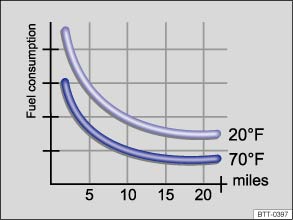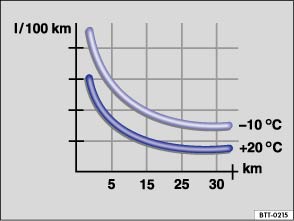Volkswagen Tiguan Owners Manual: Fuel-efficient driving

Fig. 137 Fuel consumption at 2 different outside air temperatures.

Fig. 138 Fuel consumption in l/100 km at 2 different outside air temperatures.
 Read and follow the introductory information and
safety information first⇒
Read and follow the introductory information and
safety information first⇒ Introduction
to the subject
Introduction
to the subject Driving defensively and economically can easily reduce fuel consumption by 10 to 15%.
The vehicle consumes the most fuel when accelerating. Defensive driving requires less braking and therefore less acceleration. If possible, coast the vehicle to a stop, for example, when you can see that the next traffic light is red or is about to turn red.
Avoid traveling short distances
A cold engine consumes significantly more fuel immediately after starting. It takes a few miles (km) before the engine is warmed up and fuel consumption is stabilized.
To reduce fuel consumption and the emission of pollutants effectively, the engine and catalytic converter must reach their optimal operating temperature. Critical in this context is also the outside air temperature.
⇒ Fig. 137 and ⇒ Fig. 138 display the varying fuel consumption rates for the same distance driven, once at +68 °F (+20 °C) and once at +14 °F (-10 °C).
Therefore, avoid driving short distances unnecessarily and consolidate routes.
Under the same conditions, the vehicle consumes more fuel in winter than in summer.
Letting the engine run to warm up is not only illegal in some places, but also technically not necessary and wastes fuel.
Adjust the tire pressure
The proper tire pressure helps reduce rolling resistance as well as fuel consumption.
When purchasing new tires, always make sure that the tires are optimized for lower rolling resistance.
Use low viscosity engine oil
Fully synthetic, low viscosity engine oils that expressly comply with Volkswagen oil quality standards reduce fuel consumption. Low viscosity engine oils reduce the frictional resistance on the engine and are distributed more evenly and quickly, particularly when cold-starting the engine. The effect is particularly apparent in vehicles that frequently travel short distances.
Always ensure the right engine oil level is maintained and keep to the scheduled service intervals (engine oil changes).
Make sure the engine oil that you purchase expressly complies with Volkswagen oil quality standards and is the oil approved by Volkswagen for your vehicle.
Avoid unnecessary weight
The lighter the vehicle, the more economical and eco-friendly it will be. For example, an extra 220 lbs (100 kg) of weight increases fuel consumption by up to 1 pint per 60 miles (0.3 l/100 km).
Remove all unnecessary items and unnecessary dead weight from the vehicle.
Remove unnecessary aftermarket components
The more aerodynamic the vehicle, the less fuel it will consume. Aftermarket components such as bicycle racks reduce its aerodynamic performance.
Therefore, remove unnecessary structures and unused rack systems, particularly if planning to drive at higher speeds.
 Efficient
driving style
Efficient
driving style
Read and follow the introductory information and
safety information first⇒Introduction
to the subject Shifting faster
As a rule, the following applies: The higher gear is always the most effi ...
 Steering
Steering
...
See More:
Volkswagen Tiguan Owners Manual > Luggage compartment: Shopping bag hooks
Fig. 101 In the luggage compartment:
Shopping bag hooks.
Read and follow the introductory information and
safety information first⇒Introduction
to the subject A pull-down shopping bag hook in the upper left part of the luggage
compartment can be used for conveniently holding light shopp ...
Volkswagen Tiguan Owners Manual
Volkswagen Tiguan Service and Repair Manual
- Body exterior
- Body Interior
- General Paint Information
- Paint
- Brake System
- Suspension, Wheels, Steering
- Wheel and Tire Guide
- Towing Guide
- Wheel and Tire Guide General Information
- Communication
- Electrical Equipment General Information
- Electrical Equipment from 06/2011
- Heating, Ventilation and Air Conditioning
- Refrigerant R134a Servicing
- 6-Speed Manual Transmission 02Q, OBB, and OFB
